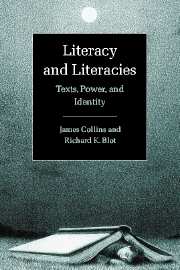Book contents
- Frontmatter
- Contents
- List of figures
- Foreword by Brian V. Street
- Preface
- Acknowledgments
- 1 Introduction: texts, power, and identity
- 2 The literacy thesis: vexed questions of rationality, development, and self
- 3 Situated approaches to the literacy debate
- 4 Literacies and power in modern nation states: Euro-American lessons
- 5 Literacies and identity formation: American cases
- 6 Literacy, power, and identity: colonial legacies and indigenous transformations
- 7 Conclusion: literacy lessons – beginnings, ends, and implications
- Notes
- References
- Index
- Studies in the Social and Cultural Foundations of Language
2 - The literacy thesis: vexed questions of rationality, development, and self
Published online by Cambridge University Press: 22 September 2009
- Frontmatter
- Contents
- List of figures
- Foreword by Brian V. Street
- Preface
- Acknowledgments
- 1 Introduction: texts, power, and identity
- 2 The literacy thesis: vexed questions of rationality, development, and self
- 3 Situated approaches to the literacy debate
- 4 Literacies and power in modern nation states: Euro-American lessons
- 5 Literacies and identity formation: American cases
- 6 Literacy, power, and identity: colonial legacies and indigenous transformations
- 7 Conclusion: literacy lessons – beginnings, ends, and implications
- Notes
- References
- Index
- Studies in the Social and Cultural Foundations of Language
Summary
The invention of writing was the greatest movement by which mankind rose from barbarism to civilization. How vast its effect was, may be best measured by looking at the low condition of tribes still living without it, dependent on memory for their traditions and rules of life, and unable to amass knowledge as we do by keeping records of events, and storing up new observations for the use of future generations. Thus it is no doubt right to draw a line between barbarian and civilized where the art of writing comes in, for this gives permanence to history, law, and science. Such knowledge so goes with writing, that when a man is spoken of as learned, we at once take it to mean that he has read many books, which are the main source men learn from.
(Tylor, 1898, pp. 179–180)Introduction
Debates about the nature of literacy have been politically important because they involve claims about “great divides,” that is, about fundamental differences in humankind, in particular in the social, cultural and cognitive development of literates and nonliterates. This can be seen in the quote above from E. B. Tylor's Anthropology: an Introduction to the Study of Man and Civilization which clearly expresses the social-evolutionary thinking that held sway a century ago. As might be expected, such sweeping claims and broad debates have led to numerous specialist controversies as well as policy-oriented studies.
- Type
- Chapter
- Information
- Literacy and LiteraciesTexts, Power, and Identity, pp. 9 - 33Publisher: Cambridge University PressPrint publication year: 2003



